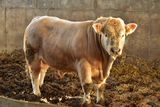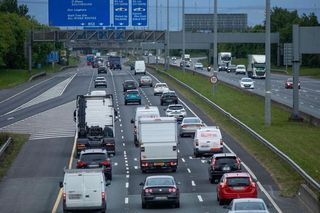Meet the regenerative farmer who is ‘all about letting the animals live naturally, not pushing them beyond what nature intended’
Éanna Diffley is implementing a modular system whereby everything on the land is mobile on his egg, sheep and pig farm in Roscommon


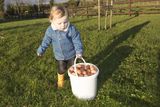
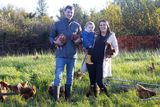
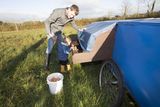

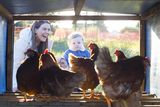
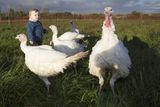
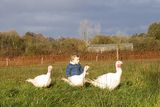
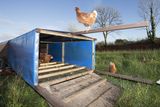
Éanna Diffley is embracing the regenerative farming life on his modular holding in Rooskey, Co Roscommon.
Having not come from a farming background, Éanna, an engineer by trade, had to use his own initiative to acquire the farm, which he now diversely stocks with hens, turkeys and lambs.
This week is all about preparation for him as he approaches his first full winter on the farm.
“I didn’t grow up on a farm, but I always had a great interest in agriculture,” he says.
Éanna with his son Liam and father John, checking on the sheep
“When my wife Therese and I came home after living in Australia for years, I wanted to make farming a way of life for me and my family, but I didn’t have any land.”
Éanna started off using a small piece of his brother-in-law’s land and bought 50 broiler chickens. Knowing this wouldn’t be their long-term abode, he built a mobile “chicken tractor” which could house the meat chickens during the night and could be manually moved each day.
The Rickshaw Henshouse
Fast-forward two years and Éanna has now bought his own 12-acre farm and is implementing a modular system whereby everything on the land is mobile.
“It means that if I was to move in the morning, I could just take everything with me. We have no permanent structures, which also eliminates any fixed capital investment in the farm,” he says.
Liam attempts to bring in the eggs
The land Éanna bought had never been farmed before, making it ideal for an organic system which he implements; he hopes to gain certification over the coming years.
“There had never been any artificial fertilisers or chemicals of any sort used on the land, which appealed to me. I was very keen to have a natural and regenerative farm as opposed to a conventional one so I have continued to keep the land free from anything un-natural,” he says.
“The land I bought had only ever been used to take one cut of hay off each year, by a neighbouring farmer.”
Therese and Liam check out the Rickshaw Henhouse
Éanna keeps a flock of laying hens as well and sells the eggs to the local community, from his farm. This week he is starting to build an “egg mobile” to house them.
“There’s about two months work involved in building the egg mobile,” says Éanna, who also works full-time as a fitter in a meat processing plant.
“I’m using a caravan chassis and adding a mesh floor. It’s essentially a small, movable shed where the laying hens will be kept at night and will lay their eggs.
The family with the hens
“I’ll have a roll-away egg nest as I do in the current hen house, where the eggs will roll away from the hens when laid, keeping them nice and clean.”
Éanna uses electric poultry netting to keep his flock in and their predators out.
There was no water supply piped through the land when Éanna bought it so this week he is starting the piping process.
“I have 600m of piping to lay through the farm to provide a water supply for my sheep.
Therese and Liam enjoy life on the farm
“I started the flock last year with just five ewes that were all having triplets. I grazed them using a mobile system too,” he says.
“I use electrified sheep wire and move them from paddock to paddock daily. I have only a few lambs left now which I’m going to bring in this week.
“We have a full week of rain coming and I’ve noticed one with sore feet so I’m going to bring them in and check them all.”
Éanna uses a regenerative farming system whereby the chickens follow the sheep in rotation. He says this helps to clean up the ground, making the land more productive.
“The hens will naturally eat parasites and fly larvae left behind after the lambs. These are a good source of protein for the hens, which results in them laying top-quality eggs. It’s a natural eco-system where each element of the farm complements another,” he says.
Liam helps Éanna collect eggs from the Rickshaw Henhouse
He also hopes to erect a polytunnel over the coming weeks to keep some of his laying hens in during the night, over the winter months. He hopes to have his egg mobile up and running by spring which will then take over from the polytunnel for the warmer months.
“I’ve only got space to house 50 laying hens at the moment but when I get the egg mobile finished I’ll be able to keep 350.”
Éanna has also just bought in some turkeys in preparation for Christmas, which he will give to family and friends in December.
He says he farms alongside nature’s cycle, allowing the animals to follow their natural path during the year.
“Animals tend to slow down over the winter so, so does the farm. I’m all about letting the animals live naturally rather than pushing them beyond what nature intended,” he says.
This slower period will allow Éanna to carry out the work he needs to do for the following season.
“I’ve a lot to get done over the coming weeks and months but I’m looking forward to getting the farm to exactly where I want it to be. I hope to sell our own meat in the future and continue with selling our eggs,” he says.
Liam checks on the turkeys
“I recently read that the average age of the Irish farmer is 55 to 56. I want to show people that not coming from a farming background doesn’t have to be a barrier if you want to farm, and the sooner you start, the sooner you’ll get there.”
Liam among the turkeys
Since embracing the farming life, Éanna has set up his own YouTube channel, Diffleys’ Family Farm, where he documents the highs and lows of life as a novice farmer.

























